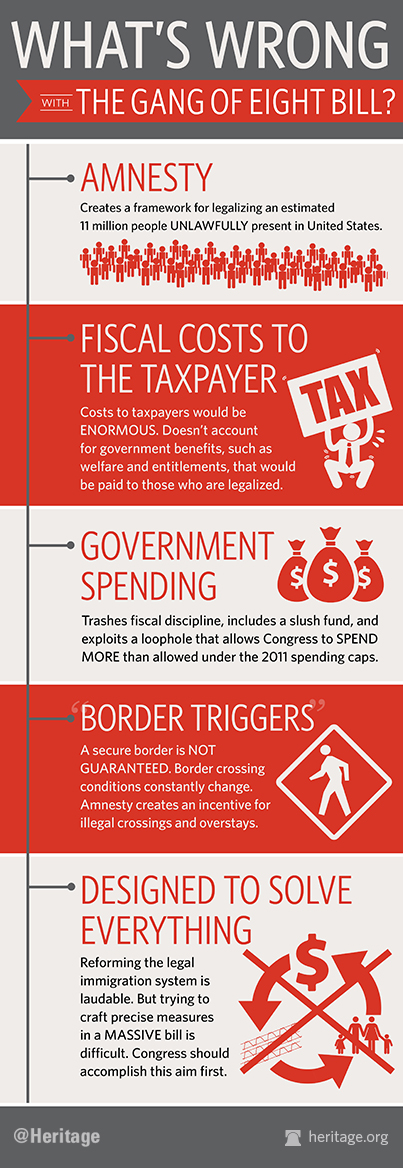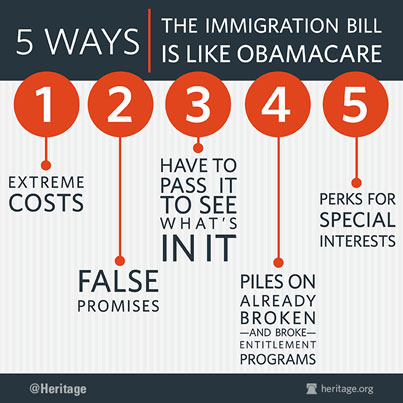The cost of amnesty
A new study by the Heritage Foundation on the cost of amnesty will reveal the following:
The immigration debate is about to get a lot more concrete.
Lawmakers need to be honest about the cost of their proposed immigration plans—and a new study due out today from The Heritage Foundation calculates the cost to taxpayers of granting amnesty to unlawful immigrants.
Yesterday on ABC’s “This Week with George Stephanopoulos,” Heritage President Jim DeMint said:
The study you’ll see from Heritage this week presents the staggering costs of another amnesty in our country and the detrimental effects, long-term, that that will have. There’s no reason we can’t begin to fix our immigration system so that we won’t make this problem worse. But the bill that’s being presented is unfair to those who came here legally; it’ll cost Americans trillions of dollars; it’ll make our unlawful immigration system worse.
Watch Jim DeMint talk about the cost of amnesty on “This Week”
DeMint previewed the study, conducted by Heritage senior research fellow in domestic policy Robert Rector, who studied the cost of amnesty under a similar proposal in 2007. DeMint said:
The way that we calculated the cost, and I read the study over the weekend, I don’t think anyone can argue with it. If you consider all the factors related to the amnesty—and believe me, this is comprehensive, that it will have a negative long-term impact on our gross domestic product. We just want Congress for once to count the cost of a bill. They are notorious for underestimating the cost and not understanding the consequences.
Heritage’s Jason Richwine, the senior policy analyst in empirical studies, says the new report will be a “resounding rebuttal to the claim from amnesty supporters that a long waiting period between the initial amnesty and citizenship will eliminate any major costs to taxpayers.”
This window of ineligibility for many government services has led supporters to argue that an amnesty will not be costly. There are two problems with this argument. First, households headed by illegal immigrants today consume some government services and pay far less in taxes….The second problem with the view that amnesty would not be costly because of the waiting period is rather obvious: After the waiting period is over, lifetime costs will be substantial.
To make sure that costs are counted accurately, Richwine says, “The estimates for the final period in our research will be calculated beginning 14 years after the initial amnesty, which is the point at which recipients could become naturalized citizens.”
Heritage’s cost analysis is unique. DeMint dismissed the idea that the Congressional Budget Office (CBO) could be trusted with calculating the bill’s costs, because it is bound by the way that Congress asks it to add the numbers. He said:
CBO said Obamacare wouldn’t cost us anything—they’re basically puppets of the Congress and the assumptions that they put in the bill. Heritage is the only organization that has done an analysis of the cost. Unlawful immigrants make up about 2 percent of our GDP, and they consume most of that. If you consider all the factors of amnesty and unlawful immigration, the cost will be in the trillions of dollars over the lifetime of these unlawful immigrants.
DeMint said that Members of Congress must read the Gang of Eight immigration proposal to make sure they know what is on the table.
“I think if people read the bill, that it will be blocked,” he said. “Because once you get into it, just like Obamacare, it is not the way it’s being advertised.”
To read the full study click here.
Read the Morning Bell and more en español every day at Heritage Libertad.





